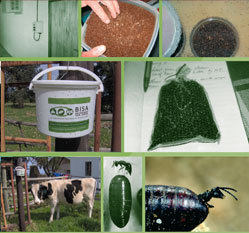
 |
INTEGRATED FLY MANAGEMENT PROGRAMMEINTRODUCTION What can be more irritating to man and his animals than ongoing pestering by flies? The nuisance value of flies is however,only half the story. Flies cause tremendous financial losses through a decrease in animal production and the spread of diseases. Dairy farmers know that milk production easily drops by one to two litres per cow per day as a result of pestering flies. Diseases transmitted by flies include: Cholera, Gastricfever, Tuberculosis, Polio, Salmonella, Typhus fever, Newcastle disease, Pink eyes and Amoebic disentry. It is clear that fly control should be a priority not only to farmers ,but also for Human Health Authorities responsible for the general health of affected communities. THE FLY LIFE CYCLE Flies breed in areas with sufficient nutrition for developing fly larvae. In human terms,this would generally be described as filth areas and include dung heaps,uncovered drains,all spilled feedstuff areas,manure dams,drainage areas,decomposing compost heaps,etc. The female fly lies up to 900 eggs in her productive life of three weeks. These eggs will develop through a few larval phases into fly pupae within seven days under favourable conditions. After two or three days adult flies will start hatching depending on climatic conditions The fly life cycle are therefore as short as 10 days, explaining the explosive potential for increase in fly numbers under favourable conditions. FLY CONTROL Everyone is familiar with at least some fly control methods such as mechanical methods, fly catching methods and chemical control. Recently biological fly control has also become a reality in South Africa, with the regular release of parasitic wasps to prevent flies from hatching from fly pupae. Effective long term fly control should consist of an integrated approach, making use of various control measures, such as:
To reduce fly breeding sites, special attention should be given to manure management, reducing feed spillage, reducing spilling from silage pitts and prevention of water leaks. Chemicals should be used wisely to reduce the inevitable build-up of fly resistance to chemicals. Rotate chemical groups and target the hot spots. Apply at adult fly rest places such as under roofs, against feed bunks, fences and vegetation. Do not use insecticides for adult flies on manure heaps, or other fly breeding sites where parasitic wasps live. Be careful to not contaminate feed or water with insecticides. Control of adult flies has a major shortcoming in that once you see flies, they already are a nuisance and probably already have caused production losses, and might have already layed eggs, providing for an endless fly nuisance cycle. Larvicides can be applied to fly breeding sites and provide control of fly emergence to a degree. If larvacides are used, then use trade names with the active ingredients Cyromazine which does not effect beneficial parasitic wasps. BIOLOGICAL CONTROL AGENTS play an important role in fly control and specific care should be taken not to destroy them by irresponsible use of chemicals. By keeping fly breeding substrates dry, fly breeding is impeded while parasitic wasp breeding is promoted. Parasitic wasps are now bred in South Africa for release on fly breeding hot spots on farms. Wasps are ordered from an Insectary for regular release on the farm. The wasps are tiny, prey specific and harmless to anything but fly pupae. Many South African farmers are already enthusiastic participants in the biological fly control programme, which has already been successful in the USA for more than 30 years. SUMMARY There can be no doubt that an effective fly control programme is vital for successful animal production systems. Erratic,short term efforts to control adult flies is almost certain to fail and is at most a sporadic waste of money. It is recommended that livestock producers develop an integrated fly control programme for their specific conditions. This will enable producers, the livestock industry and the wider community to reap significant production, animal & human welfare, and enviromental benefits. Parasitic wasps for biological fly control is now commercially available in South Africa. It should be included in an integrated approach towards fly control for cost-effective long term control of flies, while minimising insecticide usage.
|
|

